- Home
- Ann Patchett
Patron Saint of Liars Page 3
Patron Saint of Liars Read online
Page 3
He stopped and drew in his breath. He was still watching the ocean. The waves were high from the wind. They were as black as the night was black, the same way they had been blue like the sky that afternoon. My eyes had adjusted to the darkness and I could see him. He wore small wire glasses and had pale hair. He was handsome. I hadn't really thought about it before. I remember I started to cry, though I'm not sure why anymore. Maybe it was just that I had waited such a long time to hear someone say those things to me. It was romantic. What a thought, to be nineteen and be willing to give up everything in your life because someone says something to you on a dark beach that sounds romantic.
He didn't make a move toward me, and somehow that made it all the more spectacular. All those boys I'd turned away, all those boys who when they kissed me slipped my blouse out of the back of my skirt and tried to run their hands along my stomach. All the boys who said what they wanted, told me my breasts, my neck, the sides of my legs. I was stronger than all of them. I could twist myself away and walk into the water, demand that they take me home, or take myself home. But I didn't know until that night how they must have felt, wanting to press the side of their face against my breast bone and hold me. The comfort that would come from that, and I gave them so little. It was dark and Thomas Clinton could have been anyone, but I thought he knew me like God knew me. The longer we stood there in silence, my hand caught between his hand and shoulder, the more my memory set about improving his words, until they churned through my stomach and over my chest, spreading down through my arms and legs like my own blood. It was my own blood. The plainest form of nineteen-year-old sexual desire on a dark beach of the Pacific Ocean in southern California in May. And I knew so little that I took it to be a sign from God.
I faced him, pressed in chest to chest, bent his neck down with my hand, covered my mouth with his mouth, moved his hand down my back, pressed in like I was trying to pass through him, my whole body through his. I stood on one foot and wrapped my other leg behind his. I knew from every time I'd stopped before what the other body wanted from me. My hand raking up hard from the nape of his neck to the crown of his head, then down, inside the collar of his shirt, then back between us, working down the front of my dress until my arms came out of the sleeves and went back to his waist. Where was he? God help me, I don't remember him, not until the point he held my arms and pushed me back. Held me there and looked at me, and when he was afraid and couldn't look again he folded me back into my clothes and buttoned my dress and looked for the two buttons that were gone but couldn't find them in the dark, in the sand. He picked up the white sack with his dinner which had fallen from his hand and brushed the hair out of my face and took my hand and led me back to the car. He drove me home without saying a word and walked me to my door and didn't kiss me good night. He called me the next night for a date and the night after that and the night after that. He married me at the end of the summer in Our Lady of Lourdes and Father O'Donnell said the mass and his parents and his two sisters came down from Victorville and we moved into the married students' apartments and my mother cried but did so quietly in the kitchen while I took out the last of the boxes, and the next year he got a job teaching math in a high school in Marina del Rey. That is everything. That is all there was to know.
2
MY MOTHER knew how to drive but didn't. She said she'd forgotten. She'd forgotten how to ride in a car as well. She would walk everyplace she possibly could. If it was raining, she would wear jeans and a sweatshirt, wrap her work dress in a dry cleaner's bag, and put it in with her shoes and purse in one of the large, plastic I. Magnin's bags we kept stacked beneath the kitchen sink. If she had to go someplace far from home she took the bus, but she didn't like to. She said it was dirty and crowded and she didn't like to sit next to strangers. If there was an emergency, a terrible emergency, she would call a cab or Mr. Lipton, the superintendent of the building, to come and drive her. She did the night I was five years old and my eardrum burst. She did when I was fourteen and ran a fever so high I couldn't tell her who she was, even though she asked me over and over again. They took my appendix out, and when I was well Mr. Lipton drove me home, but Mother walked, because going home was not an emergency.
It's no great mystery. It was because my father had died in a car. But he didn't die in a car. He died later, in the hospital, which is the thing that makes the story tragic instead of just very sad. The car got away from him somehow, forgot gravity despite its weight, and flipped three times before digging itself into a sidewalk where no one was walking. His spine was nothing but dust. "Bone dust," my cousin told me secretly in the back yard of my uncle's house when I was seven. He was the one who gave me the details. I never got them from my mother, I never asked. It took him five weeks in intensive care to finish what had been started. It was there my father died of pneumonia, which, from what I understand, is like drowning.
But I loved to drive, the way people love forbidden things. Thomas taught me soon after we were married. He was a patient teacher and loved the fact that he could do something for me, though I wondered if later he regretted ever showing me how. We would sit on the cement steps in front of our apartment building, next to the red hibiscus that the gardener was always having to clip back so it wouldn't completely block the front door. I rolled my shorts up as far as I could, trying to get a little color on my legs while Thomas quizzed me from the safety manual. "At what point in a rainstorm are the streets most dangerous?" he asked. "Who would go through the intersection first, if two cars arrived at the same time?"
While I was taking the test, he went and bought me flowers and I wondered if the high school girls were in love with him. If they wrote their names next to his in a notebook during math class.
For a long time I couldn't bring myself to drive in San Diego, for fear of passing my mother on the street. It was a ridiculous fear because I knew every route she walked and when she walked it. But once we moved to Marina del Rey, I drove everyplace I could think of to go. I would drive to the electric company to pay the bill in person, drive to one grocery store that had good prices on staples and then another one across town because the produce was nicer. I would take Thomas to school in the morning and wait in the long line of carpooling mothers to drop him off at the door, then rejoin the line at three, or five, depending on whether or not he was coaching basketball. But then one day I missed. I was too far away, driving up the Pacific Coast Highway, listening to the radio. I was looking at the hills, thinking about the fire that had swept through last year and left them a charred pile of prickly black sticks. Now here they were, one year and a couple of floods later, as thick and green as they had ever been. The hills were the reason I was so late, and when I was sure it was impossible for me to make it back in time, I simply didn't try. Thomas was worried, he waited at school for a long time, then walked home and looked there. Then he started to think that he had possibly missed me, and that I was waiting for him, so he went back to school.
I can't remember Thomas ever getting angry with me. Sometimes, in bed at night, he would retell the story of those seven months before we met, when he would watch me.
"I remember one day you wore a red dress to church," he would begin.
"I never had a red dress," I said, my head on his chest, his arm around my shoulder.
"It was a red dress with half sleeves and a round collar. You had on flat black shoes and a black belt."
"It must have been my mother's," I said. "I don't remember it."
"You sat right in front of me. I would always get there late, so I could sit near you, but that day you came in after I did. You were alone. And you sat down right in front of me. I could smell your perfume, and your hair wasn't completely dry. I never heard a word Father O'Donnell said."
His sadness was a powerful thing then, and he never forgot it, the way my mother never forgot the Depression and so was forever saving little bits of things that might be useful later. Thomas said he made a promise to God and even though he neve
r said exactly what the promise entailed, I knew it went beyond to love and honor and obey. This was a promise with desperation in its origin, the kind of deal that Jonah cut in the belly of the whale. The difference being that I'm sure Thomas kept his promise, in the years I knew him.
So if my driving bothered him, he didn't say. If my lateness bothered him, sometimes all the way through dinner, he didn't tell me. I did try to be on time, and nearly every day I was. It's just that I had found a tightness in my chest. Some nights it woke me up, and I would lie there, taking shallow breaths. I would listen to Thomas, who slept so quietly beside me, and feel the warmth of his body in bed with me, and I would think, what makes something a sign from God? What makes something right? I didn't even know what I was thinking of, but I could feel it pressing down on me when I slept, when I ran the vacuum, when I picked out the wallpaper, bought cereal, wrote home.
The only time it seemed to go away was when I was driving. The world moved because of the directions of my hands. I rushed it past my windows as fast as I wanted. At first I knew where I was going. I would make up excuses, little reasons that took me farther and farther away, and then I gave up. I was never going anywhere and there was no sense lying to myself. People think you have to be going someplace, when, in fact, the ride is plenty. I loved to drive early in the morning, before the traffic started up. I loved to drive in the hard rains and see the world blur and clear beneath my windshield wipers. When it was dark I could see the lights of the other cars speeding by me and when it was sunny I would roll down the car window and look for the islands, Anacapa or Catalina, through a tangle of my own hair. I bought maps in every town, stuffed the glove compartment with directions. When I studied them late at night, after Thomas was asleep and the pain in my chest had gotten me up again, I was never interested in where I might go, only the contours of the roads, the kind of lines they made, their shape and width, the views I imagined they would afford me. This is what I was looking for.
I continued to light my candles up and down the Pacific Coast Highway, though I was less sure now of what to ask for. The first sign had simply changed the shape of my life, left me sharing an apartment with one person instead of another. There was a loneliness in being answered, as if God and I had less to say to each other now. I put in my coins and took my match from the box, pressed my forehead to my hands in prayer, but all I could think about were the candles that were already lit. Who had come here before me and what did they want? Did girls still want to be married and loved? Did they want to never be alone? Or had the priest lit these himself, a primer to bring the faithful from the street like moths? I could have prayed, Dear God, please keep me from Carmel, where every day my car was headed. It was a full day's drive. I would have to sleep over and come home the next morning, and how would I explain that? And what if I went and Thomas never asked me where I'd been for fear I might go away again and come back in two days or three or not at all? Would I head on to Oregon, or south through Mexico? I had the maps. But I could not pray for what I didn't want. I was careful with my prayers, now that they had been answered.
This is how the days passed, weeks and months. Places I could get to in time to come home. I worked as a temporary secretary and would call in to the placement office when the money I had didn't seem like enough. I would stay in a job for two days, a week, typing or filing, answering the phones, until whoever was missing came back and I had time to drive again. I didn't always stay on the freeways. Some things can be seen only by going off onto the secondary roads: the migrant workers moving through the strawberry fields, the palm trees. I liked to go down side streets, looking at the houses and the bicycles in the yard. Sometimes I would drive all the way to San Diego just going through neighborhoods. When I got into town I took my mother out to lunch.
"Why aren't you home?" she said. "Doesn't Thomas worry about you? My God, I hate to think of you just driving around out there."
"I only drive to see you," I said.
"I'd feel better to think of you home," she said. Even though I knew which home she meant, I liked to think it was with her.
My mother had married Joe the spring after I left, and it made me sad in a way, not her marriage, but the fact that she felt she had to wait for me to go. "Who'd have thought we'd be a couple of old married women having lunch?" she liked to say to me. My mother was happy being married. It was a gift she had given herself, the permission finally to live again the way she thought was natural. Her life was good. She was doing well at work. She had regular customers who refused to talk to anyone but her. I tried to talk to her, to tell her about the pain in my chest that could be eased only by a drive, to tell her that May reminded me so much of October and this year of last year, but I couldn't say things I didn't have words for yet. All I was sure of was that I loved her, her red lipstick, her delicate hands. Sometimes I drove all the way to San Diego but would only stand in the accessories department, watching her over a counter of scarves while she told another woman how to be beautiful.
After I left the doctor's office, after he had shaken my hand and said congratulations, I drove the car out onto the freeway and couldn't remember how to drive. I pulled over into the breakdown lane and pressed my forehead against the steering wheel. I closed my eyes and listened to the sound of the traffic whipping past me. I kept thinking, someone is going to open the passenger side door and tell me what to do. Not Thomas, not anyone I know. Someone is just going to get in the car beside me and say, Martha Rose, this is what we're going to do here. And I'd have done it, I swear to God, but no one came. Not even a cop to see if I was okay. For three years I hadn't been able to say what was wrong with my life, but at that moment it all became very clear. I had married a man I did not love. I was mistaken in my sign. I would have to have something else because this could not possibly be my life.
In a way I thought it would get easier from then on, because knowing is easier. But how I would have rather known three months before, when I could have left with nothing inside me but guilt and sorrow. I kneaded my flat stomach with my hand. I dug the heel of my hand into the skin until I could feel a small pain, and then I pressed harder.
I slept at home that night and never said a word. In the morning Thomas sat at the breakfast table, grading a stack of papers. He was teaching summer school. "Show your work," he wrote on the top of a paper, and then worked the problem at the bottom the way it should be done, line after line of numbers and letters I couldn't understand. I had never done well in geometry.
"She got the answer right," he said. "See that."
I looked at the paper. The girl had nice handwriting. I wondered if she was in love with him.
"Are you going to work today?" he asked.
"At a lawyer's office," I said. "It should last all week."
"Rose, Rose," he said and leaned over the table, over the cereal bowls and cups of coffee, and kissed my cheek, my mouth.
A lump came up in my throat. He was never a bad man. No one will ever say that Thomas Clinton was a bad man. "Come on," I said. "We need to get going."
When we got to school he told me not to worry about picking him up. "It's a nice day," he said. But in Marina del Rey they were all nice days.
"Make them all smarter," I said, because it's what I said every morning when he left.
"I'll do my best."
And then he was gone, mingling in with a sea of children. He was twenty-six years old.
When I went to Father O'Donnell, it was not to confess but to make him my accomplice. I needed the name of a place to go, someplace far away, where women had babies and left them behind, like pieces of furniture too heavy to move. A place that gave the babies to remarkable people, so fit to be parents that their sterility was unconscionable. I also wanted him to tell Thomas, when he came looking for me, that my desire to leave was sincere and he should let me go without ever telling him where I had gone. I'm making this sound very easy, when in fact it was not. It was sad enough to change my life for good, to make the
blood reverse the course of its flow in my veins.
I was going to Saint Elizabeth's. Father O'Donnell had a file, which he brought out with great difficulty. It contained fliers, nearly advertisements, that addressed the problems of unfortunate Catholic girls. Words like comfort and prayer were scattered through the texts, along with moral guidance. But I was interested in the location more than the description. Saint Elizabeth's was in Kentucky, a state whose capital I did not know. I had never wondered about Kentucky, never imagined it as a girl the way I had New York or Houston or Paris. No one I knew had ever been to Kentucky, or was planning on going, and so I thought it would be the last place anyone would look for me.
"Tell me you'll wait until tomorrow," Father O'Donnell said. "Go home to Thomas, just for tonight, or go to your mother's. This isn't a decision to be made quickly."
Father O'Donnell had baptized me and given me my first communion. He had buried my father and married me. I had been in love with him when I was a girl. I had wished he was my father. Maybe once he wished I was his daughter, because it was plain that my news was hard for him to hear. His face was flushed and damp, and there was a trembling around his mouth not unlike my own. I may have made a mistake in going to him, though it seemed right at the time. California was full of priests who would try to dissuade me but not feel disappointed in me. It was his house, not God's, that I had come to in my moment of confusion. His windows full of saints, his pews, his rack of candles. Whenever I kissed a boy in school, cut a day of classes, argued with my mother, over what I can't remember, it was not God's forgiveness I sought, but his. He was the one I told. We sat in a small room behind the altar which he used to dress in before mass. His vestments hung on wire coat hangers from the doorjamb, great satin robes that looked ridiculously beautiful with no one in them. The window in that room had plain glass in it, meant for looking out over the parking lot and not for inspiration. There was a crucifix over the washbasin where anyplace else there would have been a mirror.

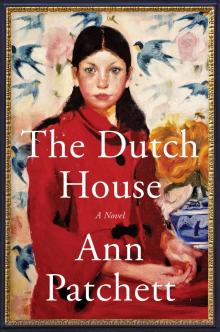 The Dutch House
The Dutch House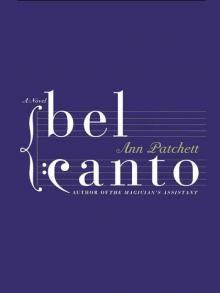 Bel Canto
Bel Canto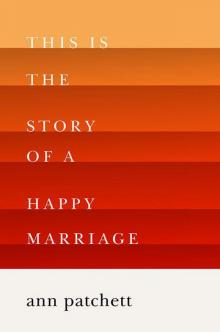 This Is the Story of a Happy Marriage
This Is the Story of a Happy Marriage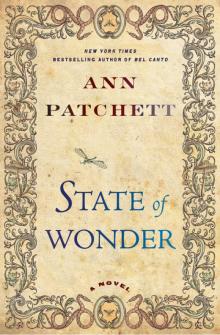 State of Wonder
State of Wonder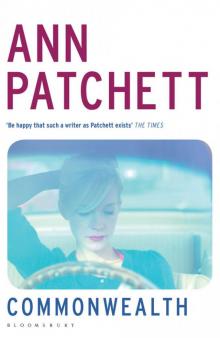 Commonwealth
Commonwealth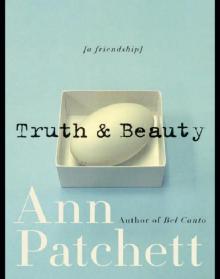 Truth & Beauty: A Friendship
Truth & Beauty: A Friendship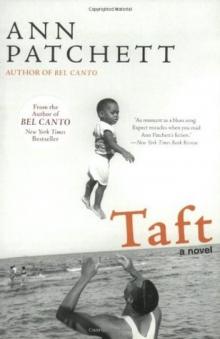 Taft
Taft What Now?
What Now?